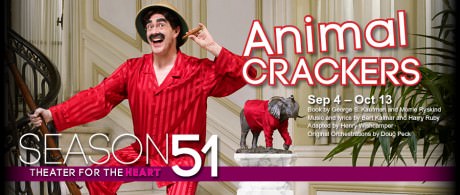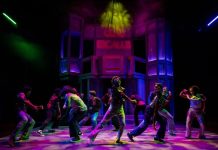Groucho. Harpo. Chico. They are best known together as The Marx Brothers and for their madcap comedy, setting the standard by which modern comedy is now compared. This 2013/2014 season at CENTERSTAGE includes a live stage production of Animal Crackers. I had the honor of sitting down with the very talented Jonathan Brody, Brad Aldous, and Bruce Randolph Nelson for this ‘tell-all’ interview about what it’s like to take on these iconic comic roles.
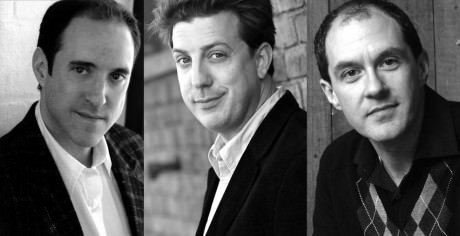
Amanda: Let’s start with a little background information so that our readers can get to know you better.
Bruce: In this production I’m playing Groucho/Captain Spaulding. Previously audiences may have just seen me here in Baltimore at Everyman Theatre back in June. I’ve been a company member there since 2002 – in The Beaux Stratagem. Before that it was August: Osage County, which was the inaugural production at the new Fayette Street location for Everyman, and the last production I did with CENTERSTAGE was back in October of last year where I was the title character in The Completely Fictional—Utterly True—Final Strange Tale of Edgar Allan Poe.
Brad: I’ve just come out of a production of Animal Crackers, at the Williamstown Theatre Festival up in Massachusetts, I was playing Harpo/The Professor there as well. Before that I was mostly in New York City doing voice and commercial work.
Jonathan: I’m playing Chico/Ravelli and before that I was also in the Williamstown Theatre Festival production of Animal Crackers with Brad, again playing my same role, and before that I was doing work with a Yiddish Theatre – a show called The Megile of Itzik Manger.
What was your previous background knowledge and experience with the Marx Brothers and their style of comedy before taking on CENTERSTAGE’s production of Animal Crackers?
Brad: I’ve been a fan since I was little, in fact there is a picture of me at age 12 dressed as Harpo in front of my Christmas tree – which proves that it wasn’t Halloween. Which makes it all the weirder. But I was a big Marx Brothers fan, a big Charlie Chaplin fan, a big fan of Abbott and Costello, and The Three Stooges and all sort of physical based comedy stuff. And then I went on and did things for a number of years, acting and stuff, and I eventually ended up at clown college. So I worked as a clown for a number of years, which sort of leads to a facility for this kind of work.
Jonathan: I also was a Marx Brothers fan as a kid and I always watched the movies whenever they came on TV, and even went to revival houses back when they had those and saw them on the big screen. And that’s just sort of my whole family’s sense of humor is just kind of…everyone was into that, and I started just working in musical theatre, I had had no clowning or physical comedy training. That’s what I’ve just often been called upon to do. It happens when you’re funny looking…but when I when I was”…what year was it, 1989? No, I can’t remember, 1990? I was cast in the show Groucho: a Life in Revue which is a play about Groucho, but I played both Harpo and Chico in that, so I was 27 at the time or something like that, and that was when I first played Harpo and Chico. I did a couple of productions of that show. I also did A Day in Hollywood, A Night in the Ukraine where I played the Chico-esque character and then was cast in Animal Crackers at the Goodman Theatre in 2004, so it’s been a rather long haul for me with the Marx Brothers over 20 years.
Brad: 2009, wasn’t it? You said 2004.
Jonathan: I lied.
Brad: I was fact checking! Look at me!
Jonathan: It’s because it was four years ago, I got the four mixed up in there somehow.
Brad: I know, I know. I just remember because I was going through there on tour and I saw you in that show.
Jonathan: So certainly once I started playing them, I studied them even more…but they’ve been good to me, those Marxs.
Bruce: You know I was by proxy growing up, my brother who’s older than me – Brad – he had going on in the background Stooges, The Marx Brothers, Chaplin, and Abbott and Costello, so they were in the periphery, but then I was drawing I guess, connections between Bugs Bunny and the way he carried himself was ‘Groucho-esque.’ And then watching episode after episode of M*A*S*H you begin to hear Groucho in Alan Alda, so those connections were there. In researching this I kind of fell in love with Groucho’s You Bet Your Life and his stunning ability to ‘in the moment’ just improvise zingers or comments, and he was just a master of wordplay and I’m assuming, you know, like any good host of a show that he was prepared and that preparation – I guess – made him available to then go off-script as it were.
You do that fairly well – that going off-script bit.
Bruce: (laughing) Believe me, I have the words given to me in order to be able to do that.
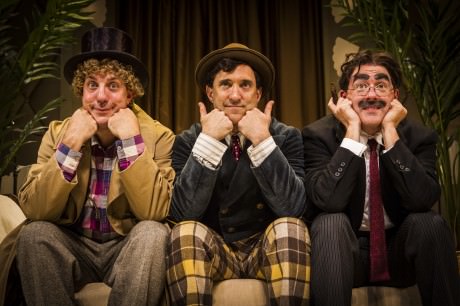
You’re going in as Groucho, Harpo, and Chico, who are then Captain Spaulding, The Professor, and Ravelli. What were the biggest challenges of embodying characters who are essentially then embodying characters of their own?
Bruce: Well you know the characters are such a light veneer to probably help the plot along more than anything else – so it’s basically who they are: Chico, Harpo, and Groucho.
Jonathan: I mean if you compare Captain Spaulding to Rufus T Firefly…
Bruce: You don’t see a lot of variation…
Brad: And Harpo still as The Professor chasing girls and stealing things and giving people his leg just like he does in Day at the Races and Horse Feathers, and everything else…
Bruce: If anything it gets to sort of help serve a plot device, and it is doing something completely separate and different.
Jonathan: Something we didn’t really explore in this production but is still sort of in my head, and we didn’t really do it at Williamstown either – but at The Goodman we talked about the idea of us being brothers and sort of being these off-stage people. And some of that, bringing that onstage in the competitiveness and the sort of fighting to get the joke from the audience, that it’s sort of a personal brother kind of thing – as opposed to the characters of Groucho, Harpo, Chico, or of the Professor, Ravelli, and Spaulding. That it’s this sort of ‘other thing’ that doesn’t read at all to the audience – but to me it sort of helps me color it a little more and bring a little depth to it.
I mean there’s the party scene where Spaulding tells his Africa story and I’m waiting to play the piano and I’m just bored of listening to him for what’s probably the 600th time hearing him tell these stories which I don’t think are funny anymore, and you know that doesn’t mean anything to the audience, but it helps for what I have to do. So I find that kind of interesting.
Brad: I mean in real life they were absolutely like ‘one-upping’ each other and screwing with each other on stage and trying to steal laughs and succeeding – and then getting each other back and pranking each other – and all that stuff. So it does lend a certain amount of—
Jonathan: That sticks in the back of our heads
Brad: Yeah, it lends itself to that. Of course!
Who is your favorite Marx Brother?
Bruce: My goodness…
Brad: Gummo. Just kidding.
Jonathan: Manfred…I think Harpo is my favorite, honestly. It’s the childlike innocence combined with the mischievousness, and he’s just sweet and funny. As much as love playing Chico, and I think they’re all great characters, but certainly as a kid it was always Harpo.
Brad: Now Harpo was absolutely my favorite. I didn’t notice as a child the underlying violence—
Jonathan: Lasciviousness? Oh…the violence!
Brad: The underlying violence, because I mean – really,- he’ll kiss a girl’s hand twice and then try to break her arm. That happens very frequently in the movies and it clicks just like this. But I always noticed the funny stuff when I was little – you know – giving people his leg, honking the horn and running around. But then when I got older I was like, “Wow, there’s really kind of a side to this that’s a little messed up.”
Bruce: Mother issues.
Brad: Something…
Jonathan: And also, as much as Chico’s piano was brilliant to watch and amusing and fascinating, watching Harpo play the harp, even a kid I remember thinking, “Oh my God, that is so beautiful – and it’s so lovely to see him in his most serious moments.”
Brad: Yeah. Bruce?
Bruce: Chico and his ability to sit down and play. And not just play conventional but to camp the stuff up is wonderful. And I always had a little crush on Chico. I always said that of the brothers, the cutest one, yes – I’ll say it out loud! And you know, I loved his sort of sly sexiness with the audience.
Jonathan: I met a woman at the opening night party who said to me, “I realized when you came out on stage that Chico was my first crush as a little girl.”
Bruce: Chico was my first crush as a little girl.
Jonathan: The woman said, “You know I’d kind of forgotten about it – but it all came back to me.” So I was glad I could help her remember that.
Brad: I will also say that although she’s not officially one of the brothers…Margaret Dumont is pretty awesome. I mean she was the ‘straight man’ for all of them for years and years and years.
Bruce: That’s a great character to play, just sort of above it all as it were – but to be the butt of everything – just great!
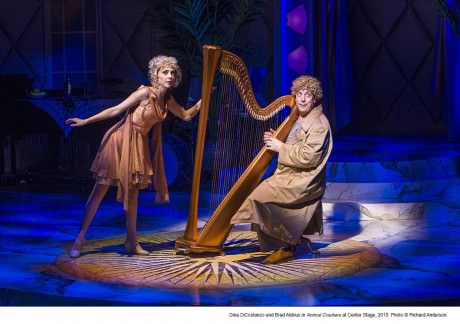
What was the most fun about the rehearsal process?
Jonathan: I think lunch break, don’t you?
Bruce: (laughing).
Brad: I do enjoy food.
Bruce: Well rehearsals…the fun frankly is now as we continue to make it our own. The rehearsals are mind-numbing amounts of going over, and detailing, and getting specific, and concrete with particular moves. It’s finally in the performance that you have them up to speed and get to do them without thinking about them. But rehearsal was fun and hard work. Comedy is not “ha-ha” easy. Add physical comedy to that and it’s a lot.
Jonathan: Brad and I came to this with the luxury of just having done it three weeks before, so this time around it wasn’t quite as crazy a work load for us.
Brad: Still crazy. But not quite as crazy.
Jonathan: I mean there’s plenty that’s different in this production from what we were used to before. We had all new choreography to learn and things like that – but we didn’t have to stress out too much because we knew we’d get there.
Brad: That’s why I felt for Bruce coming in because I had just done the same thing last time, and was like, “Oh my God!”
Jonathan: With two less weeks really.
Brad: Yeah, that’s true. But yeah, all those things. So Bruce, you’re sort of the odd man out here…
Bruce: Uh…yeah—
Jonathan: And we don’t like him.
Brad: Yeah, I mean seriously? Diva! No, totally just kidding. Bruce is great.
Bruce: In fact right now someone is out there slashing my tires, it’s probably one of them – they’re that good. Just kidding. You know, with this show, I had an audience member say to me, “This is the first time in years that I haven’t slept through a show at CENTERSTAGE!”
Jonathan: You know there was a guy at the opening night party who said, “I was dying laughing.” And I said “You know, that’s what we’re here for…to kill the audience!”
Brad: Killing them at CENTERSTGE! With comedy. But seriously, we all have a lot of fun.
Where are you guys drawing your inspirations from?
Brad: I think it’s a combination of factors. I think all of us did some research with the films obviously because it’s the only record we have. I read Harpo Speaks and some of the other books and stuff about the Marx Brothers – but it’s really – it’s physical comedy, especially with Harpo where it’s all silent – you know you have to sort of figure that out. And so I would see that stuff – but then again we always talked about how there’s no possible way to be one of these guys – and they were so amazing. You know it’s hard enough to play your own clown let alone play someone else’s. So we sort of had to pay homage to them and really try to do some of their shtick, but also bring yourself to it a bit. It’s challenging – but fun.
Jonathan: My main inspiration – I think – is Thursday when my direct deposit clears. You know, this is our job – don’t try this at home, but again the luxury for me is having had so long now playing Chico that I really can relax into it. And whether it’s what the Marx Brothers themselves were doing or not. But with Chico and Ravelli – it’s all ‘id.’ They’re just out there to have fun. And to find money, food, and sex. And I just sort of go out there and live in that world and nothing else really matters, and as long as I’m concentrated on those objectives – it’s good.
I mean the whole plot of stealing paintings evolves because this pretty girl asks me to do it and I’m like, “Alright, I’ll do it!” And then we have this whole crazy slapstick scene where you really wonder, “Is this really worth the trouble of what we’re doing?” But that’s just like a dog with a bone – they go with it and have fun.
Brad: Did you gamble a lot in preparation for this role?
Jonathan: (laughing) Um…maybe. But it’s really…it’s just that sense of joy and mischief and just going out and having a good time. While being a very disciplined actor, it’s not about fooling around as me Jonathan; it’s about Chico Ravelli having a good time.
Bruce: I love their anarchy. I think that there is certainly inspiration there to thumb their nose at society. You know with sort of a communal horn honk they take the wind out of the sails.
Jonathan: And Groucho really gets to do that verbally.
Bruce: Yeah. But that’s not what’s inspirational for me necessarily. It’s watching that one scene from that one movie…it’s in a state room on a boat and he does this dance. And he’s into a closet and out of a closet and up on the bed and it might be the same movie – or maybe not – but his cat on the balustrade moment just meowing to whoever. I just fucking love that, “What just happened?” moment where you realize he just did that just to do that.
Brad: They were sort of doing non-sequiturs before they became popular.
Bruce: Yeah, little cut-aways.
I can only imagine what you guys must be thinking and feeling right before you walk on stage every night because this must be so much fun. To just sort of let loose as clowns but iconic clowns, still with a script and still with form, but how amazing that must be.
Jonathan: Right before we start, we all start the show as butlers.
Bruce: So the three of us begin as butlers right there at the very very top.
Jonathan: So we actually start off in this very reserved place. So I’m preparing backstage – which means me reading my newspaper until I hear the announcement finish. I don’t start in a clowny kind of place.
Bruce: There have been a couple of times where you have finished reading and been on stage in such a short amount of time that I’ve thought, “How did he get there so quickly?”
Brad: I keep expecting to hear the pages of the New York Times rustling as he rushes to the stage.
Bruce: It’s pushing a big thing up a hill. It’s non-stop.
Jonathan: You know then Brad and I are party guests for the first ten minutes of the show so we don’t even get into Marx Brothers zaniness for a little while.
Brad: Until Bruce comes out, basically.
Bruce: You know my arrival – that’s the genius of the physical comedian, the clown who choreographed this –
Brad: Paul Kalina.
Bruce: That was a brilliant choice.
Brad: A lot of his stage production is just brilliance.
What is it like integrating what some might call “dated” humor with the slapstick and old-fashioned wordplays, into your routine? Was it challenging, and do you think it translates well to the ‘modern’ audience?
Jonathan: I don’t think it’s dated, honestly.
Brad: I don’t either.
Jonathan: It just depends on where you look for it – but in all the Farley Brother movies—
Brad: Chris Farley…SNL…
Jonathan: And the Hangover movies…you know, SNL, sketch comedy is still out there all over the place. Improv companies are huge all over the place. And you know slapstick is still certainly in the movies; you don’t see it much on television now as you might of during I Love Lucy—
Brad: Scrubs and things like that have quite a bit of physical comedy in them. I mean – I feel like there’s a lot of it.
Jonathan: So I think it’s still out there. Some of the references – the lines in the show about Calvin Coolidge or whatever – is that who you mention? You mention some President…
Bruce: Coolidge? Do I say Coolidge? Yes, Coolidge is President.
Jonathan: That, but the humor too – the non-sequitur humor that you’ll find on Family Guy and Arrested Development and any kind of – well in so much of the comedy today, and Paul had said that the Marx Brothers sort of were the first really popular American comedians. It was of comedy that really hadn’t been successful. Others were doing it at the time but they were the ones that made it famous. And it’s kept on through Monty Python and Kids in the Hall . Pretty much any contemporary comedy improv group has Marx Brothers’ influence – so I don’t really think there’s anything dated about it as far as comedy goes.
Bruce: And Groucho’s ‘rat-ta-tat-tat’ – he didn’t linger. If there wasn’t a pun you didn’t like, there’ll be one very soon. So it’s just like, “We’re not going to take a lot of time to feel our way through the humor. We’re just going to put it out there quickly.”
Jonathan: That’s another thing that Paul said, that you never want to let the audience get ahead of you. You know some people would say, “It goes by so quickly I can hardly keep up!” But that’s what we want. If you wait for the laugh then the audience is with you and they know what’s coming and you just want to keep pushing through like a crazy train.
Bruce: You said something interesting about groans. You want the occasional groan to play it. But as soon as the audience is groaning more often than laughing -they’ve gotten ahead of you and you’ve slowed down and aren’t keeping up.
Brad: You’re also giving them some power which you don’t want to do. (laughing). We’ll tell you how to react.
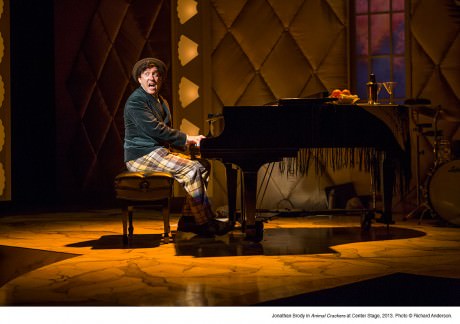
Did you guys have any musical experience going into this project? I know Bruce we had talked about this before and your answer was, “I can sing-ish.”
Bruce: I hear ‘ish’ still. And dance-ish. I can move OK. But there are people who have been doing it for a lot longer…so…yeah.
Jonathan: At the beginning of my career it was almost all musical theatre. I actually started as a dancer – not by choice per say – but that’s where I was getting the work. And it’s only the past 10-15 years that I’ve been doing more straight plays and now I kind of have a 50/50 balance. It’s such a range of musicals from very conventional book musicals like The Sound of Music and Oklahoma! onto a lot of shows that are – what I call “non-fourth-wall” shows – where you’re talking directly to the audience and the audience is a major player in a way, which kind of happens in this and with the previous Marx Brothers things I’ve done as well. So this doesn’t feel hugely out of the ordinary for me, but I don’t have to do a lot of singing and dancing, which is great!
Brad: Before these two productions the last musical I did was here in Maryland in 19…hmm…let’s just say it was a really long time ago. It was my senior year in high school – but a long time ago – and I was playing Albert in Bye, Bye, Birdie, and that’s the last time I did musical theatre.
Each brother has something really distinctive about him – Groucho has his physicality, Chico has the accent, and Harpo – well Harpo has his silence. How did you guys take these distinguishing characteristics and transform them to make them your own?
Bruce: I think actually Groucho’s thing is ‘crazy verbal gymnastics.’ And you know the occasional physical thing thrown in. Well he’s certainly flamboyant, this particular Groucho. So maybe I have infused him with a sense of that. I really sort of took to heart his carrying on in his “Lydia” song where he just flits and floats through that song, and I’ve sort of used that as my baseline.
Jonathan: I think for me it’s trying to translate what we only know from film onto the stage. And none of us having seen them on stage and there being no films – at least worthwhile – of seeing them perform on stage.
Brad: There’s the one little film clip of them on stage.
Jonathan: Yeah, but you don’t really get much of a sense of it. I think that’s where more of me comes out in that I’m playing for an audience and I’m just sort of a whore that way. So I will do a take to the audience after a punch line, which I don’t know if Chico would have done – maybe he wouldn’t have. But in watching the movies, Chico doesn’t smile a whole lot but that I think is part of my own personality that I bring to it. More of the little – I don’t know – ‘dour’ is not the right word, not that he ever came across as especially serious, but it’s certainly a slightly more heightened energy for the stage. You know – I think they probably pulled back a little bit for what they did on film compared to what they would have did on stage. So it’s trying to just sort of ‘bring that and heighten it a bit’ for a live audience where more of my own persona comes out.
Bruce: They do all seem to be looking for ‘a fight’ – you know in one way or another they’re ready for some action.
Brad: I think with Harpo it is really the basic clown in the sense that he’s just looking to have fun and to play with things and to play with people. And he does have a little bit of what would sort of be like ADHD and it’s like “Ooh something shiny?” or “Oh someone new to play with? A new game to play?” And it’s just trying to find that—
Jonathan: Squirrel!
Brad: Exactly! Trying to find that popping between what’s keeping your attention at the time and then also trying to bring that different energy. It’s just different on the stage and there are certain things that Harpo does on film that if I did on stage that I don’t think would read on stage at all. So you have to bring a little bit of a different energy and do things slightly differently.
Jonathan, did you come into this with previous pianistic experience?
Brad: He learned it all in the last two weeks!
Jonathan: Yes. I’d love to say that but I took piano lessons as a kid and was a very bad student. I studied piano until I was twelve and then I started taking dance lessons. But once I stopped studying piano I started just sort of playing what I enjoyed and I had gotten better. When I first played Chico – whenever it was – 27, when I was 27 not 1927 – that was really daunting trying to replicate what he did so brilliantly. And I felt like quite the sham for quite a long time. But fortunately over the years now I have gotten more comfortable doing what tricky things that I can – and I try and bring the beauty that he brought to it as much as he can. But I still am not a terribly skilled pianist – I’m just a big faker. Put a classical piece in front of me and ask me to site-read it and nothing will happen. I am definitely into it, with a lot of practice.
Brad: I play the piano a little tiny bit at the end of that scene.
Jonathan: Brad plays about 12 instruments – a little tiny bit.
Brad: I do! I’m the jack of all instruments, master of none. Except for the tuba – I’m pretty good at the tuba.
Brad, talk to us a little bit about your experience as the silent character on stage. What’s it like not necessarily having lines to fall back on, having to depend on just your actions?
Brad: Well, I feel like with any kind of a role like this – I do have lines – they’re just not spoken. There are so many things that come into scenes where somebody will have a line to me or something – and there’s a reaction to that actor that if I was saying a line it would have that sort of energy behind it. But instead it just has to come out of my physicality or in a look. And there are just so many little things that I do say – albeit non-verbally – or with my horn or with my actions, but in some ways it’s a little tougher because you have to be so on-point about certain things at certain times That didn’t really make any sense, but it really is – he’s silent in the sense that he doesn’t actually say anything. But he says so much in all the things that he does and you know there are laughs. There are takes and looks and bits and things that I do that are just like a punch line. It’s just a different sort of a thing because it’s an action.
Jonathan: Sometimes it’s an actual punch.
Brad: Yes – sometimes it’s an actual punch. That’s true. Or a smack.
Bruce, you tend to do a lot of the audience interaction. What is that like for you?
Bruce: I do have a strong improv background, and I do teach it. Although, you know, I love my script and I love the lines…and I feel that maybe my improv skill when I was a fearless 20-year-old maybe soared more. As you get older, I don’t know, sometimes I get more conscious, or self-conscious. So what was the question again? I know..something about improv— right! Audience. I love that connecting with the crowd. And it takes some time. You know, get the first couple of performances under your belt and then feel…well I feel that I’m finally comfortable going in and being with them in that way. I love that kind of connecting but initially I’m so preoccupied by different points that need to get hit in the script and uh—
Brad: And your hair.
Bruce: And my hair.
Brad: As we all are…come on.
Bruce: All those sort of peripheral things that your mind is tracking. You think, “OK. Week two I’ll be comfortable going out to the audience and having fun with them.”
What is the moment in the show that guarantees you a good hearty laugh every night?
Brad: I would say… some of the lines that I laugh at the most are the jokes which don’t go over at all and it just makes me laugh because they’re so dated that people are like, “What?” – and that really makes me laugh because I’m weird that way. But I would say probably for me the thing that makes me laugh the most in the show -Oh God! – I love watching people’s facial expressions. And watching Bruce and Catherine during “Show Me A Rose” just makes me laugh. Little things like that. Catching someone’s facial expressions or a look is to me really really fun. I mean -honestly – I think we laugh a lot. There are parts that are just funny. There’s things that really pop. It’s hard to pick one.
Bruce: You know you get a sort of a solidness of this show under your feet and it’s those moments that happen I guess outside of the script, and what you’ve learned to do that are some of the funniest moments. Where the audience lingers on a laugh, for example, and you’re going to ride that with them – it’s a bit of new business to sort of take your attention. It’s not a moment in the play – but I did love coming out and I forgot my bottom part of my bathing suit. I’m supposed to be in this red-striped—
Brad: Mini-skirt.
Bruce: Not a mini-skirt. A tunic. And that sent everyone on stage into a little bit of laughter here and there – and that’s always fun.
Brad: There were wig issues that night too, I think. Lots of fun stuff going on that night.
Jonathan: I don’t know if there’s ever anything on stage that makes me want to lose it—
Brad: (whispering) Everything Brad does…that’s the right answer.
Jonathan: Everything Brad does. But seriously, part of that comes from now having done this for a long time. So when something unexpected happens, but just in general I don’t usually crack up on stage because I’m concentrated – and when I’m in character that doesn’t happen. I mean there are scenes that I love that I’m in but I don’t watch them at the moment because I’m either making a costume change or I’m reading my newspaper. But I love the ‘hunga-dunga’ scene and the ‘strange interlude’ scene. I think they’re hilarious.
Brad: I just got one of the jokes like a week ago and I’ve been doing this show for months – and it was one of your lines – and then one day I was just like, “Oooh!” or maybe I asked somebody and they told me and I was like “Oh my God!” So you do get surprised still.
Bruce: That was me late in the rehearsal process.
Jonathan: We talk about that all the time. Back at Williamstown, Mara – who was playing Arabella – said, “I thought ‘weak end’ was just referring to Saturday and Sunday. I never got that.”
Bruce: She and I had that in common. Never got that one originally.
Is it a challenge to take on a character that comes with preconceived notions?
Bruce: Yes.
Jonathan: Very much so.
Brad: Absolutely.
Jonathan: You know I just had to eventually get over that because I felt for the longest time, “I’m not worthy, I’m not worthy.” But fortunately the audience helps with their laughter and applause which helps me feel like. “Alright, I guess I’m pulling the wool over their eyes.” We also have wonderful help from great costumes—
Brad: Amazing costumes!
Jonathan: And they help put us where we need to be and once people see that it’s 50% of the battle and they’re like, “Oh yeah! They are the Marx Brothers.” But it’s something that keeps me ever vigilant to make sure that I’m not slipping and that I’m not failing to do them as much justice as I can.
Bruce: After the talkback we had recently a patron said, “I didn’t buy it. I didn’t buy you as Groucho until the scene with Chandler, and then I said, OK.” So people have specific ideas and memories and personal ownership—
Brad: And a lot of the people who come to see this show saw the actual Marx Brothers!
Bruce: And of course the sometimes fragile actor hears something like that and thinks, “Oh good God! I am the sham!” And then you know after you talk yourself down from the ledge you realize this is what I have to give and for fuck’s sake – own it!
Jonathan: I will say what’s also kind of delicious is that people bring young kids to the show who’ve never seen the Marx Brothers movies and who don’t know anything about them. So for one the pressure is a little bit less because these kids – they have no expectations – and they love it! And they laugh and it’s so wonderful -and you hope that then they will go and watch the movies and appreciate it.
Brad: And become new fans.
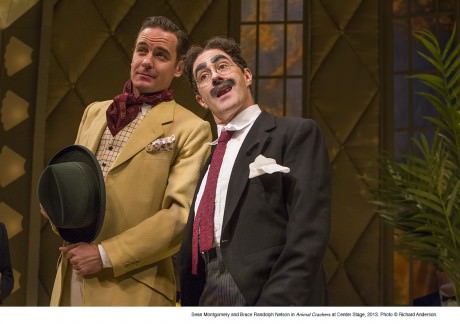
What has this show taught you about yourself as a performer?
Jonathan: You’re right that’s the hard one.
Brad: What has it taught me about myself as a performer? I will say for me I am doing a lot of things in this show that I didn’t necessarily know how to do – or think I could do – before I started the rehearsal processes. And there are just a lot challenges physically and musically and emotionally – just kidding. But it’s a sprint for all of us. It is just non-stop. So you have to be in really good shape. So it’s taught me that – I don’t really know how to end that. As a performer I feel like it’s a huge undertaking playing one of these brothers but I think we’ve all found a way to do it that is apparently sort of ringing true with the audiences – and so that’s really sort of amazing. I don’t think I really answered your question. It’s taught me how to love! Just kidding. How’s that?
Jonathan: I don’t know that this show has taught me anything – but it helps me to appreciate doing the kind of work that is so in my wheelhouse – that is so what I really do and encompasses so much of my talent – to use that word very loosely. It’s just great to have that kind of reminder because not all shows are like that for me. Some shows can be a chore, you know – maybe I just don’t like the show, and some shows I don’t feel as adequate doing what I do. But this show suits me personally so well and I’ve had the luxury of a lot of rehearsal time – so I can just feel extra prepared and comfortable and yet feel spontaneous on stage. And all those things are just gifts that we don’t always get in our work. Let’s see if Bruce can maybe answer the actual question.
Bruce: I read a quote, and of course I get all of my information from Facebook, but it said, “Despite the anxiety, despite the worries, despite the fretting, one’s track record for getting up and carrying on with the day is 100%.” So my track record for carrying on despite all of it is just that. I rise to the occasion and this particular occasion was a big one to rise to. So I guess what it taught me was that it’s possible. And all the crazy voices that say it isn’t – are just that: crazy voices. Cheers.
If you could have your Marx brother here with you, so Bruce with Grouch, Brad with Harpo, and Jonathan with Chico, and you could ask him just one question…
Bruce: Hmm, well, I might already know this answer, but the question that pops to mind is…when he said “I wouldn’t want to be a member of a group that I was a part of…” And maybe I already know the answer to this and I’ve forgotten, but did he say that because he just wanted to have that grouchy zinger going all that time, and who wants to be around that? Or was it the fact that as a Jew he felt like he was not worthy.
Jonathan: I think I would want to ask…one: “Was it as much fun as it looked?” And I’d just be curious to know for him what were the differences of doing it live on stage verses making movies? Not a terribly interesting question but the answers would fascinate me.
Brad: I think I would ask Harpo if he actually read the documents that were taped to his leg when he left Russia. Because in his biography he talks about delivering documents to somebody over in Russia during the Cold War from the Soviet Union when he was over there. And he says he never looked – but come on! If you had secret documents strapped to your leg wouldn’t you at some point pull them out and look at them? I feel like you would! They were from the US embassy or something there, I’m assuming. Maybe they were in code or something, I don’t know, but I’d want to know!
___
Animal Crackers plays through October 13, 2013 at CENTERSTAGE – 700 North Calvert Street, in Baltimore, MD. For tickets, call the box office at (410) 332-0033, or purchase them online.
LINKS
Review of Animal Crackers on DCMetroTheaterArts.
An Interview with Bruce Randolph Nelson on The Beaux Stratagem at Everyman Theatre by Amanda Gunther.


